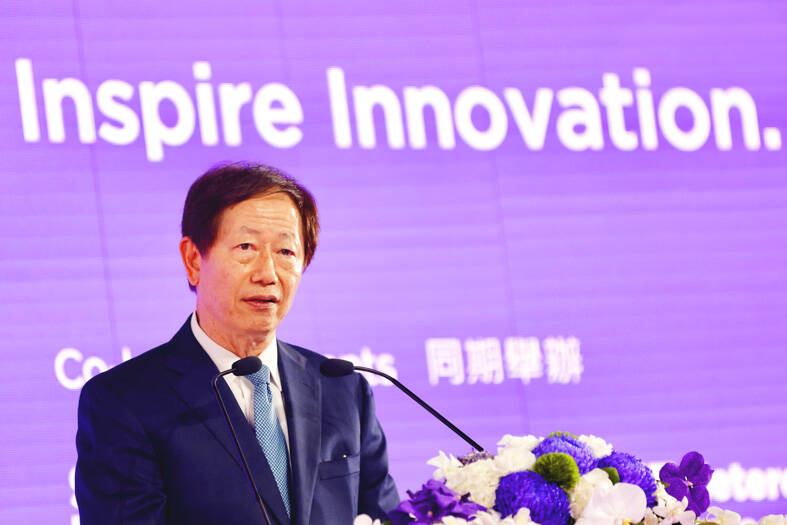Former Taiwan Semiconductor Manufacturing Co (TSMC, 台積電) chairman Mark Liu (劉德音) has been appointed to the board of directors of US-based dynamic random access memory (DRAM) chip supplier Micron Technology Inc.
Liu’s role is to focus on boosting the firm’s artificial intelligence (AI) development, the US company said.
Micron chairman, president and chief executive officer Sanjay Mehrotra in a statement released on Wednesday described Liu as a visionary leader with technical expertise and business acumen from his 30 years at TSMC.

Photo: Ritchie B. Tongo, EPA-EFE
“He [Liu] has decades of experience leading one of the world’s most advanced and sophisticated semiconductor companies, with fab operations at the largest scale,” Mehrotra said. “His experience will help guide Micron as we scale our business to address the growing opportunities unleashed by AI — from the data center to the edge.”
Liu is also the founder and chairman of multistrategy investment fund J&M Copper Beech Ventures.
He also founded the Technology Competitiveness and Industrial Policy Center at the University of California, Berkeley, to advise policymakers and lawmakers on enhancing the competitiveness of the US tech industry.
The former TSMC chairman began his career at Intel Corp before moving to AT&T Bell Laboratories, where he conducted fundamental research on high-speed electronics.
Liu then joined TSMC in 1993 and was responsible for building the company’s first eight-inch and 12-inch fabs.
He held increasingly key leadership positions, including senior vice president from 2004 to 2012, cochief operations officer from 2012 to 2013, president and cochief executive officer from 2013 to 2018 and executive chairman from 2018 until his retirement from TSMC in June last year, where he was succeeded by C.C. Wei (魏哲家).
Liu’s other board commitments at Micron include serving on the University of California, Berkeley, Engineering Advisory Board, the company said.
Micron recruited Mark Liu to boost cooperation with TSMC to speed up its high bandwidth memory, Liu Pei-chen (劉佩真), a Taiwan Industry Economics Database researcher, told the Central News Agency.

SELL-OFF: Investors expect tariff-driven volatility as the local boarse reopens today, while analysts say government support and solid fundamentals would steady sentiment Local investors are bracing for a sharp market downturn today as the nation’s financial markets resume trading following a two-day closure for national holidays before the weekend, with sentiment rattled by US President Donald Trump’s sweeping tariff announcement. Trump’s unveiling of new “reciprocal tariffs” on Wednesday triggered a sell-off in global markets, with the FTSE Taiwan Index Futures — a benchmark for Taiwanese equities traded in Singapore — tumbling 9.2 percent over the past two sessions. Meanwhile, the American depositary receipts (ADRs) of Taiwan Semiconductor Manufacturing Co (TSMC, 台積電), the most heavily weighted stock on the TAIEX, plunged 13.8 percent in

A wave of stop-loss selling and panic selling hit Taiwan's stock market at its opening today, with the weighted index plunging 2,086 points — a drop of more than 9.7 percent — marking the largest intraday point and percentage loss on record. The index bottomed out at 19,212.02, while futures were locked limit-down, with more than 1,000 stocks hitting their daily drop limit. Three heavyweight stocks — Taiwan Semiconductor Manufacturing Co (TSMC, 台積電), Hon Hai Precision Industry Co (Foxconn, 鴻海精密) and MediaTek (聯發科) — hit their limit-down prices as soon as the market opened, falling to NT$848 (US$25.54), NT$138.5 and NT$1,295 respectively. TSMC's

TARIFFS: The global ‘panic atmosphere remains strong,’ and foreign investors have continued to sell their holdings since the start of the year, the Ministry of Finance said The government yesterday authorized the activation of its NT$500 billion (US$15.15 billion) National Stabilization Fund (NSF) to prop up the local stock market after two days of sharp falls in reaction to US President Donald Trump’s new import tariffs. The Ministry of Finance said in a statement after the market close that the steering committee of the fund had been given the go-ahead to intervene in the market to bolster Taiwanese shares in a time of crisis. The fund has been authorized to use its assets “to carry out market stabilization tasks as appropriate to maintain the stability of Taiwan’s

In a small town in Paraguay, a showdown is brewing between traditional producers of yerba mate, a bitter herbal tea popular across South America, and miners of a shinier treasure: gold. A rush for the precious metal is pitting mate growers and indigenous groups against the expanding operations of small-scale miners who, until recently, were their neighbors, not nemeses. “They [the miners] have destroyed everything... The canals, springs, swamps,” said Vidal Britez, president of the Yerba Mate Producers’ Association of the town of Paso Yobai, about 210km east of capital Asuncion. “You can see the pollution from the dead fish.